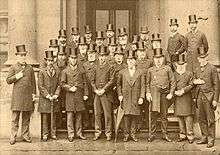First Colonial Conference
| 1887 Colonial Conference | |
|---|---|
 Attending representatives. | |
| Dates | 4 April–6 May 1887 |
| Cities |
|
| Chair |
Sir Henry Thurston Holland (Secretary of State for the Colonies) |
| Precedes | 1894 Colonial Conference |
| Key points | |
|
Imperial co-operation, Naval defence, Pacific telegraph cable, Royal title | |
The First Colonial Conference met in London in 1887 on the occasion of Queen Victoria's Golden Jubilee. It was organised at the behest of the Imperial Federation League in hopes of creating closer ties between the colonies and the United Kingdom. It was attended by more than 100 delegates, mostly unofficial observers, from both self-governing and dependent colonies. India, however, was not represented.[1]
Among other things discussed, the colonies in Australia and New Zealand agreed to pay £126,000 per annum towards the Royal Navy to help pay for the United Kingdom's naval deployments in the Pacific. In exchange, the British government agreed not to reduce its Pacific Station without colonial consent.[2]
A proposal to lay a telegraph cable between Vancouver and Australia was approved. A Resolution to extend the Queen's title to "Queen of the United Kingdom of Great Britain, Ireland, and the Colonies, and all Dependencies thereof, and Empress of India" was also adopted.[3]
The conference was only a deliberative body and resolutions passed were not binding.[1]
Participants
The conference was hosted by Queen Victoria and the Prime Minister of the United Kingdom, Lord Salisbury, with Sir Henry Thurston Holland (Secretary of State for the Colonies) acting as chair and the Premiers and other representatives of various colonies as delegates. The colonies invited to send delegates were Newfoundland Colony, Canada, Colony of New South Wales, Colony of Tasmania, Cape of Good Hope, South Australia, the Colony of New Zealand, Victoria, Queensland, Western Australia, and Natal Colony. Various other colonies were invited to send representatives to the opening ceremonies but not participate as delegates. William A. Baillie-Hamilton, the Private Secretary to the Secretary of State for the Colonies, acted as Secretary to the Conference.[4]
References
- 1 2 Olson, James S., ed. (1991). Historical Dictionary of European Imperialism. Greenwood Press. pp. 135–136. ISBN 0-3132-6257-8.
- ↑ The Cambridge History of the British Empire, Volume 4. Cambridge University Press. 1929. p. 409.
- ↑ "Gladstone's Motion Lost". New York Times. May 7, 1887. second last paragraph.
- ↑ https://books.google.ca/books?id=MDpOAAAAYAAJ&lpg=PA74&pg=PA5#v=onepage&q=thorburn&f=false
- Hansard 25 March 1887
- 1887 - Colonial Conference, London (broken link)
See also
- Imperial Conference
- All Red Line - the eventual network of telegraph cables connecting the British Empire.